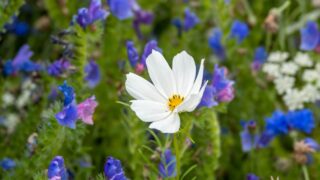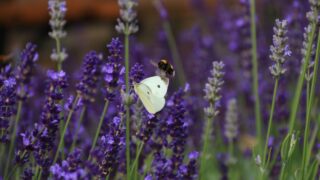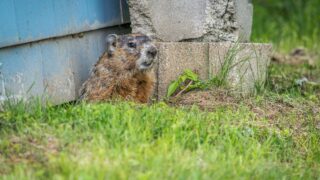Wildflower gardens come in many shapes and sizes, from lush meadows to tidy flower beds. In addition to beautiful, bright colors, wildflowers offer many benefits, such as attracting pollinators and providing wildlife habitat. Native wildflowers also tend to require less care than many other garden plants, as they are well adapted to your soil and …
Serena Manickam
If you like a tidy, green lawn, have grazing animals, or are tired of digging weeds out of your flower beds, buttercups might not be your friends. These sunny yellow flowers can bring a smile to a child’s face (“Do you like butter?”), but they can quickly become a nuisance to gardeners. Before we dive …
Lavender plants suffer from very few pests and even fewer diseases. In fact, as an aromatic herb, lavender may even help protect other plants from pests by repelling harmful insects or disguising target plants with its strong fragrance. But all of this brings little comfort and no help when lavender plants do show signs of …
Invasive plants, or noxious weeds, displace plants endemic to Idaho and can significantly alter native ecosystems. They can increase erosion, alter soil composition, impact water flow and silt buildup in waterways, and reduce wildlife habitat. In the garden, noxious weeds may be masquerading as cultivated plants, or perhaps they lurk among the weeds. Learning about …
Did you know your lawn might be draining more than just your time? For the average American household, nearly 30% of water use goes straight to the yard—and in drier states, that number can skyrocket to 60%. With the typical family spending over $1,000 a year on water, thirsty landscaping can take a serious toll …
I felt a sort of thrill this spring when we began seeing baby groundhogs in the yard. Each morning found me eagerly peering out the bedroom window to watch the adorable, bumbling balls of fur learning to graze on the abundant clover in the lawn, safely outside the garden fence and within scurrying distance of …
From the coast to mountains and from mild climates to nearly arctic conditions, Maine encompasses more than a hundred types of habitats, home to some 1,500 native plants. Unfortunately, these varied habitats also provide ideal conditions for a wide range of non-native invasive species. The Maine Department of Agriculture, Conservation, and Forestry lists 125 invasive …
Bright, colorful petunias bloom all summer, whether planted in a flower bed, container, window box, or hanging basket. These easy-to-please annuals come in a wide range of colors and fit almost anywhere. Petunias even have a place in the vegetable garden, where they attract beneficial insects and might even help with pest control! Pair petunias …
Have you ever a noticed an anthill in your garden and started to panic? Don’t worry. Red ants might not be the garden pests we believe them to be. If you see them swarming around an unhealthy plant, you will likely be eager to learn how to get rid of red ants in the garden. However, …
Growing new plants from cuttings is the closest thing to garden magic. With just a snip of fresh growth and a bit of patience, you can turn one plant into many—no seeds required. Place a stem in water or tuck it into soil, and soon it sprouts roots of its own, ready to flourish. It’s …










